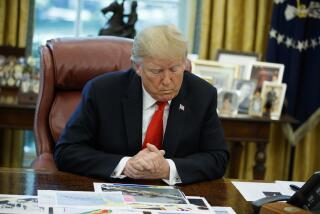Bush’s final year in charge
One year from today, the next president of the United States will take the oath of office. If history is any guide, for the next 365 days, President Bush is likely to be one of the lamest ducks in history. Deeply unpopular, mired in the fifth year of war in Iraq and presiding over an economy slipping toward recession, he will be given no quarter by the Democratic-controlled Congress whose powers he has consistently sought to crimp. But history must not be permitted to circumscribe what Bush and Congress could yet accomplish. Both must reject the election-year paralysis that has become a self-defeating political tradition.
Lame-duck years typically feature torpor broken by last-ditch presidential foreign policy initiatives, usually unsuccessful. This year, the world faces problems far too serious to shelve for 12 months in deference to the American political calendar.
Our suggested to-do list:
Renewable energy. As greenhouse gases reach the tipping point, this nation faces a stark choice: lead or suffer horrendous climactic consequences. With the Bush administration as obstructionist in chief, the Bali climate change conference in December accomplished little. But this is one time when the U.S. should act unilaterally and inspire other nations to follow. Last year, Congress failed to include provisions in its energy law that would have established a federal standard for how much of the nation’s electricity must come from renewable sources. Congressional leaders should reintroduce that renewable portfolio standard legislation and pass it by July. That would give Bush time to sign the bill before the Beijing Olympics and challenge China (and the rest of the world) to make a similar commitment.
Sugar ethanol. The advent of $100-a-barrel oil poses another choice. In the short run, we will either enrich oil-flush regimes such as Saudi Arabia, Iran, Russia and Venezuela, or enrich Brazilian farmers and cut our carbon emissions at the same time. As this page has argued, the domestic corn-based ethanol bonanza is an environmental menace. Brazilian ethanol derived from sugar is seven times more efficient (because it requires only one-seventh the amount of land to produce the same energy content). Yet the U.S. imposes punitive tariffs on foreign ethanol -- 54 cents a gallon, plus a 2.5% duty. Congress should revoke those tariffs to lower U.S. energy bills, allow for a greener choice and sweeten relations with a critical South American democracy. At the same time, it should impose limits on ethanol imports from Brazil to prevent the clearing of the Amazon rain forest for sugar cultivation.
Nuclear controls. The seizure of highly enriched uranium in the Republic of Georgia last year proves once again that the most likely source for terrorists to obtain nuclear weapons materiel isn’t Pakistan or Iran, at least not yet. It’s Russia, which has secured only about half of its nuclear materiel. To its credit, the Bush administration has embraced the Global Threat Reduction Initiative to secure such materiel overseas, but at the current pace, it will take 15 years to complete the job. Experts say it can be done in four or five years. And it must.
A nuclear terrorism czar. Amazingly, there is no senior official in the U.S. whose sole responsibility is to prevent nuclear terrorism. Bureaucracies being what they are, it’s essential that one person coordinate efforts and be accountable. Bush could appoint a White House deputy national security advisor for preventing nuclear terrorism. Best of all, he wouldn’t even need congressional approval.
Close Guantanamo. Bush could do his country and his legacy a big favor by closing the detention center that has become an international symbol of U.S. injustice. Terrorism suspects should be indicted and transferred to prisons such as Ft. Leavenworth, repatriated or released.
More to Read
A cure for the common opinion
Get thought-provoking perspectives with our weekly newsletter.
You may occasionally receive promotional content from the Los Angeles Times.










